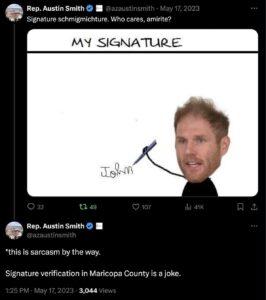
Arizona legislators (and all candidates for those seats) have a few hurdles to qualify for the ballot. One of them is gathering enough signatures from voters in the district. The precise amount depends on a few factors, but is generally in the ballpark of 400 signatures. Considering that voters can sign online in what are essentially pre-qualified signatures, this threshold is generally little more than a tiny speed bump on their path to re-election.
Except that apparently this year, it wasn’t. In a truly shocking development, two incumbents failed to get the required number of signatures, and thus will not be on the ballot this year. Both happened partially as a result of falsified signatures, but in very different ways.
The first casualty was Melody Hernandez, representative in legislative district 8, a Democrat stronghold primarily in Tempe. She submitted a total number of signatures that was only about 10% over the minimum, a razor-thin buffer of safety (a minimum recommended buffer is 20 or 25%, but incumbents routinely submit double the minimum). Numerous inconsistencies were found in signatures she reportedly collected from a signature collection group, and the challenge to those signatures was successful.
This represents a real problem to Arizona Democrats in their quest to seek control of the Capitol. Along with the myriad resignations and seats that needed to be filled this year, Democrats will have to rely on the write-in campaign of former legislator Lauren Kuby to fill this safe Dem seat. Hernandez had also racked up $3,000 in campaign finance violation fees, exemplifying a campaign that was sloppy at best, utterly negligent at worst (and most likely).
Next is Austin Smith, representative in the Republican stronghold of district 29 in the west valley. Democrats challenged his signatures and found numerous inconsistencies, and Smith withdrew his candidacy instead of putting up a public fight. In Smith’s case, he reportedly collected the bulk of these signatures himself, which means that he may now face significant penalties for election fraud.
Smith had been popular with conservative groups such as Turning Point USA, and had risen to prominence by flirting with election conspiracy theories. In perhaps the most ironic (or worst juju) moment in Arizona politics this year, he mocked County Recorder Stephen Richer for the office’s signature verification process. It seems as though signature verification does, in fact, work adequately.

Ultimately, good riddance to both. Their signature requirements were so small that well organized districts can surpass that threshold for incumbents in a single weekend. Candidates can meet that threshold all by themselves with about two weeks of work. Their inability or lack of willingness to do the bare minimum of organizing demonstrates a degree of laziness and/or incompetence that should disqualify them for public office. We all deserve better than that, and thankfully they showed their cards before we were stuck with them for two more years.

